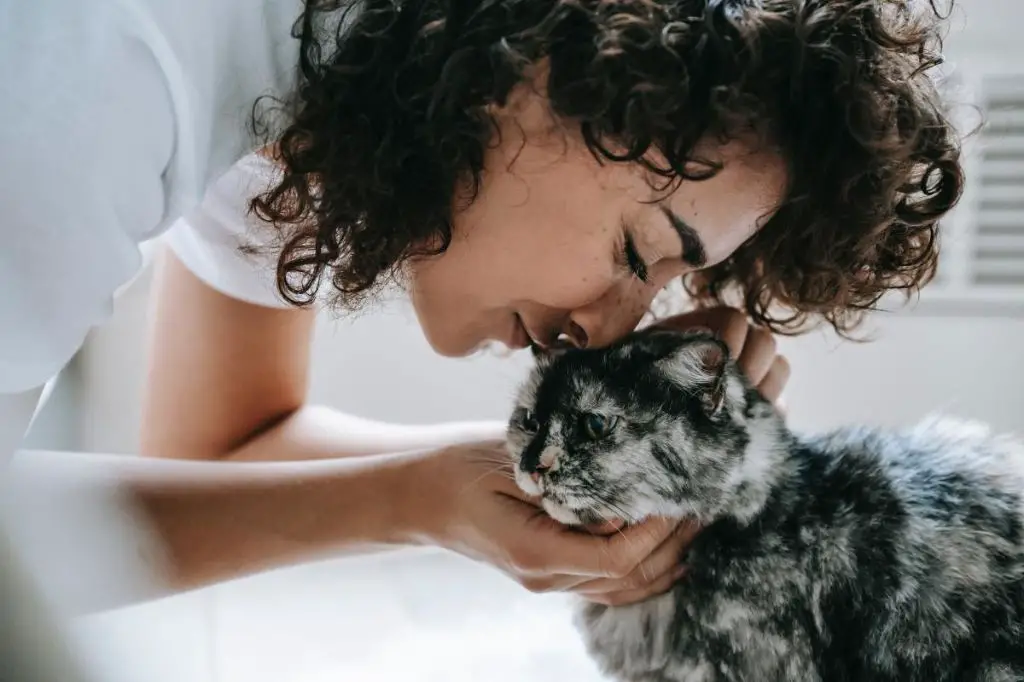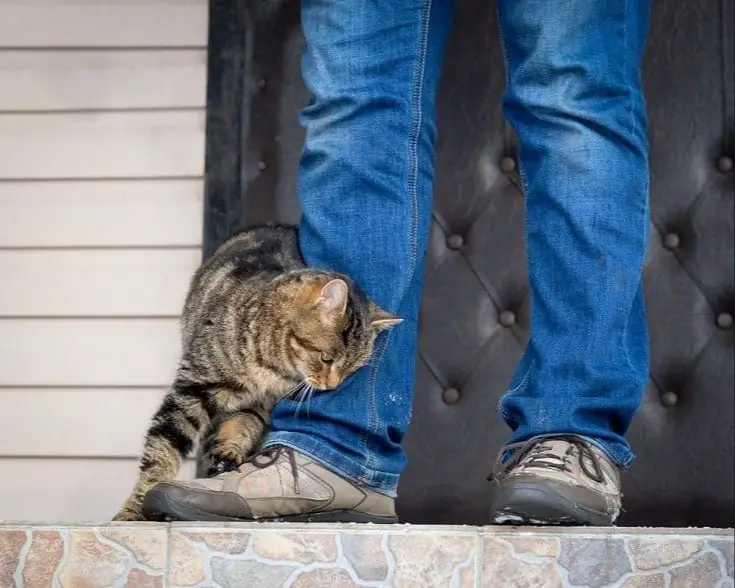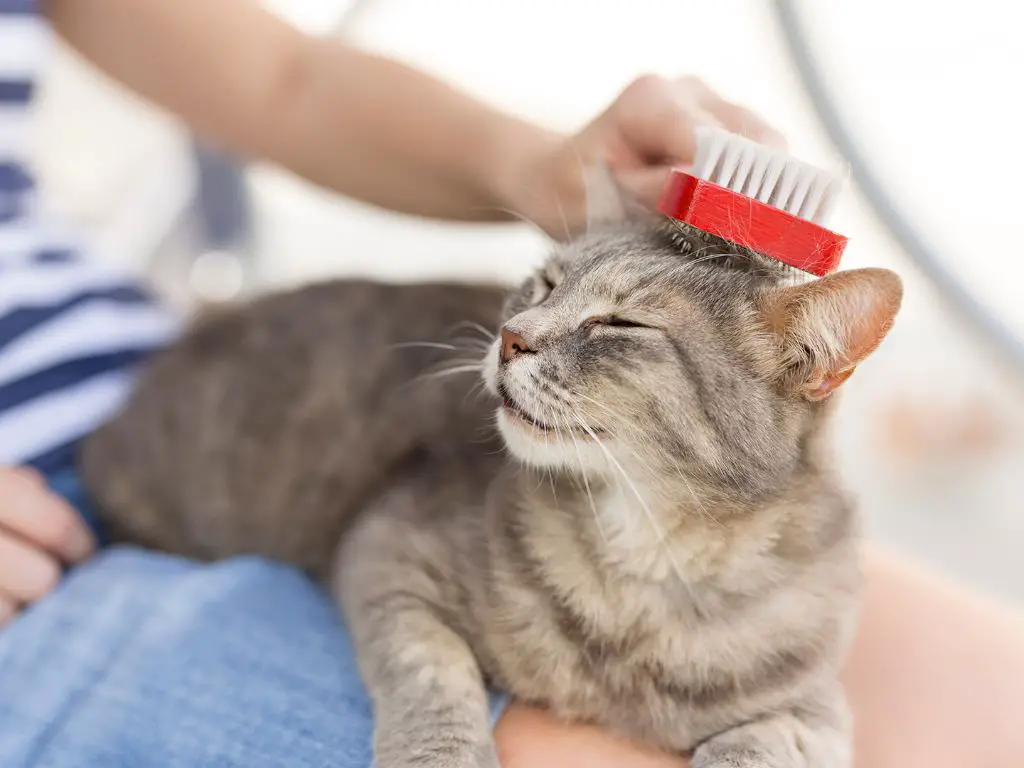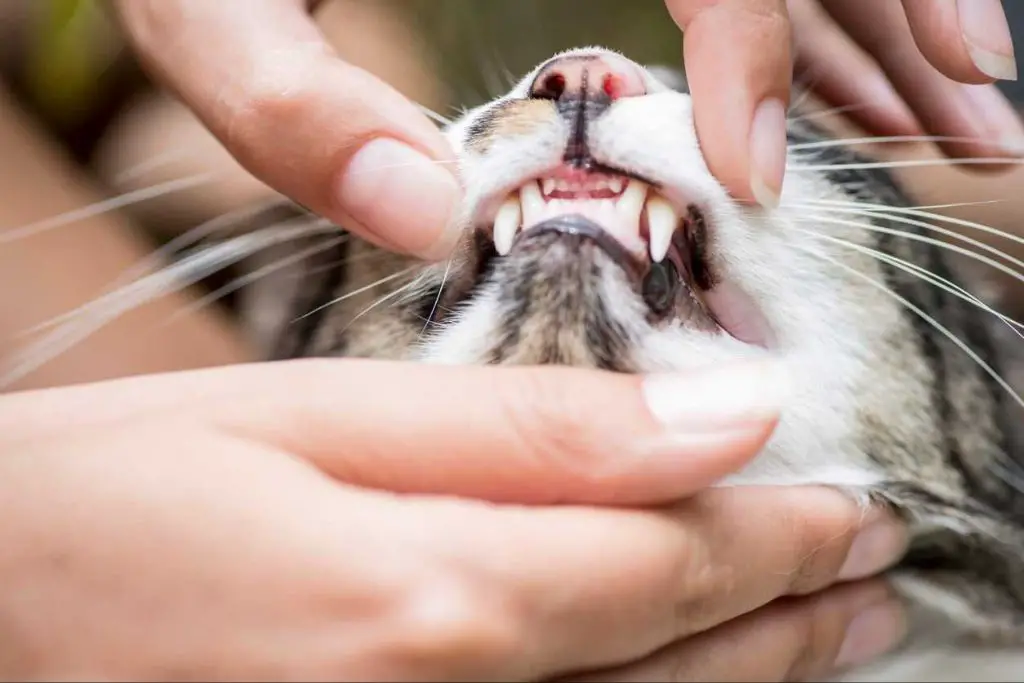Introduction
“A home without a cat — and a well-fed, well-petted and properly revered cat — may be a perfect home, perhaps, but how can it prove title?” – Mark Twain
Cats are beloved pets for many people across the world. With an estimated 94 million cats living in households in the United States alone, cats are the most popular pet after freshwater fish. However, cats also have a distinct smell that not everyone loves. This raises the question – do cat owners end up smelling like cats too?
Cats Have a Distinct Smell

A cat’s natural scent derives largely from its pheromones, specialized scent-marking hormones often secreted through their saliva, urine, or paw pads. Cats use these pheromones to mark territory and communicate with other cats, though humans are not able to smell these chemical signals (source). For instance, female cats in heat release pheromones to attract male cats. Cats also scratch objects to leave pheromone traces from the glands in their paw pads (source).
While humans cannot detect feline pheromones, we can smell cats’ natural oils that stick to their fur and skin. A cat’s light musky “cat smell” comes from oils produced by their sebaceous glands that coat their fur and skin. The distinct scent provides cats information about other animals, though humans may find the smell stronger and more pronounced.
Cat Smell Transfers to Owners

When cats rub against their owners, their scent glands release pheromones that get transferred to the owner’s clothes and skin. This is a normal feline behavior called bunting or head butting that allows cats to mix their scent with their human’s scent as a way to show affection and mark their territory (source). Petting and cuddling cats also leads to their natural oils and dander getting on owners through close contact.
A cat’s powerful sense of smell allows them to pick up on even the slightest traces of their own scent. So when a cat’s scent rubs off on their owner, the cat feels reassured and familiar with the human’s scent. This is one reason why cat owners may start to smell like cats over time after repeated scent transfers through petting, holding, and snuggling their feline companions.
Some People Are More Sensitive
Some individuals may be more sensitive to cat smells than others. According to Prevention, people with allergies often have a diminished sense of smell and taste due to nasal congestion (source). VeryWell Health notes that when nasal passages are inflamed or blocked due to allergies, odors have a harder time reaching smell receptors (source). However, once allergy symptoms clear, smell sensitivity tends to increase again. This means those with allergies or sensitive noses may be more acutely aware of any cat odors in the home.
Additionally, some people are just more sensitive to smells in general, whether it’s perfume, food, pets or other sources. For these individuals, cat urine, dander or litter box odors may be more easily noticed on clothing or in the home. While not at the level of a clinical condition, their sense of smell is more attuned, for better or worse when it comes to tolerating pet odors.
Reducing Cat Smells

There are several ways cat owners can reduce smells in their home to minimize the “cat smell” on themselves and in their environment. Regular grooming and bathing of cats can cut down on odors from oil and dander in their fur. Cat owners should brush their cats weekly and give occasional baths when needed with cat-safe shampoo. Daily litter box scooping and completely changing litter every 2-3 weeks also helps control smell.
Around the house, cleaning hard surfaces with a 50/50 vinegar and water solution helps eliminate odors (Source). Carpets, furniture, and drapes should be regularly vacuumed and steam cleaned. Air filters and purifiers, especially those with activated carbon, can remove cat allergens and odors from the air.
By staying on top of grooming and cleaning, owners can reduce the cat smells that transfer to them and build up in their home.
Being a Responsible Cat Owner
To reduce cat smells, it’s important for cat owners to regularly groom and clean their cats. Most experts recommend grooming long and medium haired cats daily, while short haired cats only need grooming about once a week (RSPCA). Having your cat professionally groomed by a groomer every 4-6 weeks is also recommended (Veterinarian NYC). Regular grooming keeps your cat’s coat clean and reduces shedding around the house.
In addition to grooming, cat owners should scoop litter boxes at least once daily. The litter should be completely replaced every 1-2 weeks to reduce ammonia smells from urine. Washing litter boxes with soap and water monthly also helps control odors. Keeping litter boxes clean is an important part of responsible cat ownership.
Other Household Smells
While cats do have a distinct odor, it’s important to keep things in perspective. Cat smells are generally mild compared to other common household odors. For example, studies show that cat urine and feces produce less intense smells than dog waste (source).
Chemicals like cleaners and air fresheners can also have very strong odors. Cooking food, especially fish or other pungent ingredients, produces smells that most find more overpowering than cats. Other pets like rodents, birds, or reptiles have their own distinct scents as well.
Overall, cat smells tend to blend into the background of everyday household odors. While noticeable to some, especially sensitive noses, they are relatively subtle compared to many other smells we live with daily.
Asking Others
One of the best ways to know if you smell like cats is to get unbiased assessments from friends or family. Since our noses adapt to smells over time, it can be hard to detect odors on ourselves that may be obvious to others. Ask someone you trust who doesn’t live with your cats to provide honest feedback on any lingering odors.
Let them know you want their candid opinion and won’t be offended if they notice any smells. Explain that you’ve become nose blind to your cats and want an outside perspective. You could ask them to sniff your hair, clothes, and any belongings that spend time around your cats.
It’s best to ask a few different people to cross-check assessments. Tell them specifically what to sniff for, like cat urine or litter box scents. Phrase it gently by asking “Do I smell a little like cats today?” Open communication will reveal if you need to address any lingering odors.
While you may miss obvious smells, having a friend or family member sniff test your belongings provides an invaluable unbiased nose. Their fresh perspective can confirm you smell cat-free or prompt you to take action if odors linger.
Acclimating to the Smell

It’s common for cat owners to gradually become nose blind to the smells associated with their feline companions. This phenomenon is known as odor fatigue or olfactory adaptation, where people become desensitized to certain odors over time with consistent exposure (1).
When you first bring a cat into your home, the smells may be quite noticeable and even unpleasant. But as you live with your cat day after day, your brain starts to tune out those odors. After a while, you may not even notice the typical cat smells anymore.
Odor fatigue occurs because scent receptors in your nose become overstimulated from the consistent aroma. Your brain decreases its sensitivity to the stimulus in order to avoid overload. It’s a normal adaptive process that allows you to function in environments with constant background odors (2).
For cat owners, this means the distinctive cat smells like litter boxes, fur, and scratching posts fade into the background. You acclimate to the odors and they don’t bother you as much. Of course, guests coming into your home will notice the smells right away.
It’s important for cat owners to periodically “reset” their noses by leaving the house for a while. That allows you to recenter your normal odor sensitivity. You can also ask trusted friends to provide an honest nose check on your home’s smell when you return.
With time, cat owners do grow accustomed to the smells. But maintaining good litter box hygiene, grooming, and air quality can help keep odors at bay for you and your guests.
(1) https://www.scientificamerican.com/article/why-do-we-stop-smelling/
(2) https://www.apartmenttherapy.com/how-to-get-rid-of-pet-smells-200789
Conclusion
Cats can have a distinctive scent that transfers to their owners through close contact and shared living spaces. Some people are more sensitive to smells than others and may notice cat odors more. While no owner should be shamed for smelling like their pet, there are ways to reduce cat smells through grooming, litter maintenance, home cleaning, laundering fabrics, and ventilating spaces. Being a responsible cat owner includes making sure your home doesn’t have an excessive cat smell that bothers visitors or indicates poor hygiene. It’s best to maintain open communication with housemates and politely ask others if any pet smells are noticeable. In the end, living with a cat requires some level of acceptance and acclimation to their natural scents.
In conclusion, mild cat scents on owners is normal, but strong odors could signify a need for changes in care routines. With proper habits, homes with cats can stay fresh. The bond between cats and their owners outweighs minor smell factors for those dedicated to feline companions.

